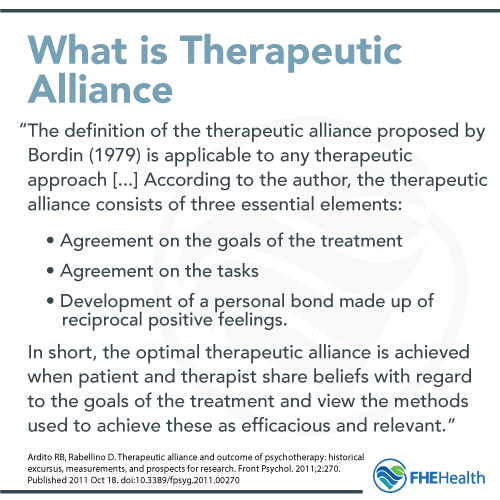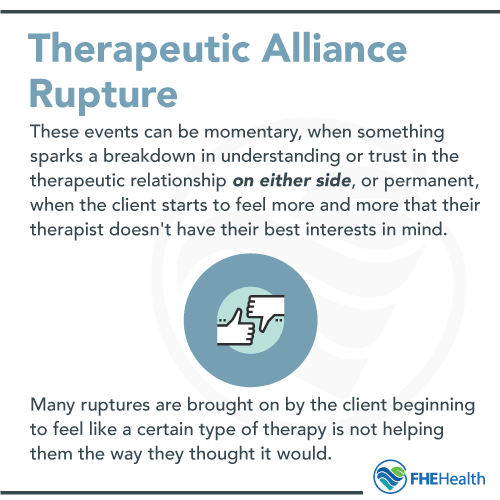
Imagine seeing a therapist you didn’t completely trust. This wouldn’t be a very productive relationship, right? This is the high-level explanation of a concept called “therapeutic alliance.” It’s the bond you and your therapist share as part of a two-sided, good-faith interaction to provide recovery and understanding, no matter the type or the subject of therapy.
Here, we’re going to discuss why the therapeutic alliance is so important and how to understand when a “therapeutic alliance rupture” is hurting the potential outcomes of your time in treatment. At FHE Health, we recognize this concept as being an important step to quality treatment for our patients, and we use these learnings to find therapists with respect for therapeutic alliance and the flexibility to overcome ruptures to provide the best possible outcomes for the people they treat in a clinical setting.
What Is the Therapeutic Alliance?
 The therapeutic alliance is also referred to as the “working alliance” or the “helping alliance.” It’s essentially a way to encapsulate the relationship between an individual and the trained professional providing psychotherapy as a way to help them recover from or manage a range of conditions.
The therapeutic alliance is also referred to as the “working alliance” or the “helping alliance.” It’s essentially a way to encapsulate the relationship between an individual and the trained professional providing psychotherapy as a way to help them recover from or manage a range of conditions.
The therapeutic alliance isn’t black or white — it’s a spectrum. You don’t either have a therapeutic alliance or not have one for the same reason you can’t just expect to be fully recovered in your first day with a new therapist. It takes time to build the trust that the therapeutic alliance requires.
The definition of therapeutic alliance has changed greatly over time. It has roots in Freud’s descriptions of transference and was regarded as negative, although he later treated transference as potentially beneficial. Bordin’s proposal of therapeutic views the alliance as an influencer in the outcome of therapy. It affects the patient’s commitment to continuing treatment and their likelihood of accepting and following direction.
So how does this develop? There’s a good chance your therapist, whether consciously or subconsciously, is taking a few key steps to try to establish this trust while the relationship is new. According to The Huffington Post:
- They’ll do things to build faith in the fact that they’re genuinely interested in your problems. This includes being attentive, asking thoughtful questions and giving you their complete focus for the duration of the session.
- They’ll express understanding of your point of view. Good therapists have the ability to express empathy to their clients, making you feel like you’re speaking to someone who understands.
- They’ll build confidence that they’ll be able to help. In order to trust your therapist, you need to have faith in their understanding of the mechanics of your problem. This is why mental health professionals ask so many pointed questions about what’s troubling you.
You may not even notice these therapeutic relationship phases developing, but trained psychologists understand how to build trust with their clients using these methods.
The Importance of Therapeutic Alliance
A strong therapeutic alliance leads to better outcomes in therapy in a way that is actually proven by studies.
An empirical analysis of various studies involving the correlation between the therapeutic relationship and clinical outcomes of psychotherapy found that in almost all cases studied, the effectiveness of treatment depended on the strength of this relationship.
Think about it practically. What would happen if you didn’t trust your therapist? Many topics discussed during sessions with a counselor involve very personal topics, with the client opening themselves up and expressing vulnerability. If there’s no trust in the equation, clients will begin to withhold details or not let themselves open up in sessions.
Does Therapeutic Alliance Exist in All Forms of Therapy?
The simple answer is yes, it can and it should. There are few better examples of the importance of therapeutic alliance than in more jarring, experimental therapies.
For example, we’ve talked about exposure therapy recently. This is a nontraditional therapeutic method, that when done responsibly has potential positive outcomes for patients, especially those suffering from post-traumatic stress disorder (PTSD).
In a therapy where the mental health professional is trying to facilitate recovery by exposing the client to their triggers, an absence of the all-important therapeutic alliance could actually turn this potential benefit into harm for a patient who doesn’t trust them or the method.
Therapeutic Alliance Ruptures
 When a patient starts to lose trust in their therapist, it’s called a therapeutic alliance rupture. These events can be momentary when something sparks a breakdown in understanding or trust in the therapeutic relationship on either side or permanent when the client starts to feel more and more that their therapist doesn’t have their best interests in mind.
When a patient starts to lose trust in their therapist, it’s called a therapeutic alliance rupture. These events can be momentary when something sparks a breakdown in understanding or trust in the therapeutic relationship on either side or permanent when the client starts to feel more and more that their therapist doesn’t have their best interests in mind.
What’s more, these ruptures aren’t only possible but common in many cases, in all types of therapy. Many ruptures are brought on by the client beginning to feel like a certain type of therapy is not helping them the way they thought it would. This is not something that the therapist is at fault for in many cases. Even if that’s the case, if the professional doesn’t have the ability to repair the relationship, the client would probably be better off opting for a new type of therapy or at least a new therapist.
How to Overcome Therapeutic Alliance Ruptures
There are a few strategies to overcome therapeutic ruptures and strengthen the bond between client and practitioner.
For Therapists
- Be open and encourage a client to express negative feelings about the therapeutic alliance.
- Be honest about the factors you believe caused a rupture.
- Ensure that the client understands what you’re doing from a therapeutic perspective.
For People in Therapy
While it’s the burden of the therapist to repair a rupture in the client-therapist relationship, the client can ask themselves a few questions as they go through therapy to continue to assess the quality of the therapeutic alliance:
- Do I trust my therapist?
- Is my therapist open about acknowledging ruptures in our clinical relationship?
- Is my therapist willing to admit mistakes made in the course of treatment?
In rare cases, ruptures in the therapeutic alliance can’t be repaired. If this occurs, doing what’s best for your recovery is most likely finding a new therapist who can better create and sustain this bond.
High-Quality Therapy at FHE Health
With the understanding that the strength of the therapeutic alliance is one of the largest predictors of success in therapy, it’s crucial to provide patients access to high-quality therapy carried out by experts in the therapeutic field.
To learn more about access to quality therapy for mental health conditions and substance abuse disorders, contact FHE Health today.






